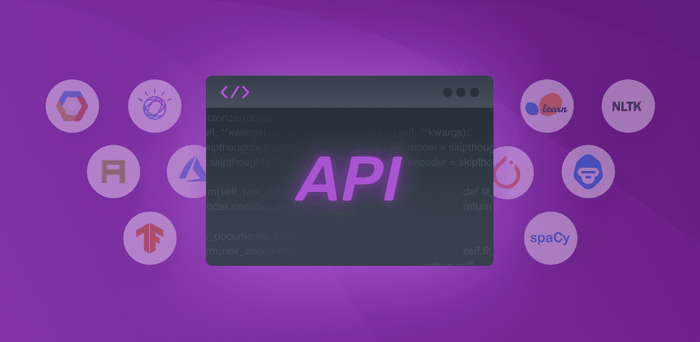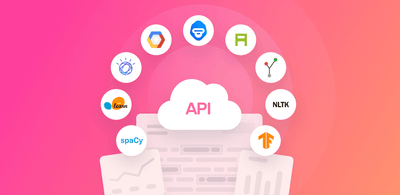10 of The Best Text Mining APIs to Analyze Business Data

Text mining also referred to as text analysis, uses AI technology to find meaningful information in large volumes of unstructured text.
This means that you can start getting value from your data ‒ like customer support tickets and social media mentions ‒ by sorting batches of text by topic, sentiment, urgency, language, and intent. Or extracting keywords, entities, and other relevant insights.
Try out this sentiment analysis analyzer to see how quickly it sorts your text.
The most popular way to get started with text mining is by integrating APIs into your existing tools. Instead of building software entirely from scratch, APIs enable you to harness the power of ready-made tools. You can choose from open-source or SaaS software, depending on skills, budgets, and timing.
While open-source software is free, flexible, and provides all kinds of resources, you’ll need a team of devs that are well versed in machine learning to use open-source APIs. SaaS tools, on the other hand, give you access to powerful text mining solutions that are fast and simple to implement with just a few lines of code: no programming skills or machine learning expertise needed.
Top 10 Text Mining APIs (Open Source & SaaS)
Looking for a tool that truly suits your business needs? Check out this selection of the best open-source and SaaS text mining APIs:
Best SaaS APIs
MonkeyLearn
MonkeyLearn is a cloud-based machine learning platform that analyzes text data. It’s intuitive and easy to use, and you can perform a variety of text mining tasks (sentiment analysis, entity extraction, topic classification, and more) using the MonkeyLearn API.
To get started right away, sign up to MonkeyLearn for free to gain access to a full suite of text mining models, like this pre-trained sentiment analysis model. If you demand higher accuracy ‒ for example, a model that’s able to recognize industry-specific vocabulary ‒ you should opt to build a customized solution. Custom models can be trained with your own data and criteria, and don’t require you to have any machine learning expertise.
Manage your models through the API, which is available in all major programming languages (Python, Java, Ruby, Javascript, and more) or connect them to third-party apps like Google Sheets, Zapier, and Zendesk with your unique API key.
IBM Watson
IBM Watson is an AI platform with an array of cloud services and pre-built solutions to extract value from data. With the Watson Natural Understanding API, developers can build custom deep learning models to detect keywords, entities, categories, sentiment, and more. Through the API, you can analyze text files or even a public URL.
The Watson platform includes other powerful APIs for text analysis, such as Watson Natural Language Classifier (to build classification models) and Watson Tone Analyzer (to identify emotions in text data). All of them are aimed at developers with no machine learning background looking for an easy way to implement text mining.
Aylien
Aylien is a cloud-based AI platform that helps companies find insights from documents, tweets, blogs, and reviews. Combining machine learning and Natural Language Processing (NLP) it allows users to understand topics, sentiment, and entities in text.
Through the Aylien Text Analysis API, you can easily access ready-to-use models to support common text mining tasks (including real-time analysis). The API is available in 7 languages, and it doesn’t require any NLP expertise.
Google Cloud NLP
Google Cloud Natural Language Processing provides a suite of AI and machine learning solutions to analyze unstructured text.
Using the Cloud NLP API, developers can understand topics and sentiment in customer conversations, analyze syntax (like tokens, dependency, and part-of-speech), and identify entities across documents.
To work with all these features, you can choose to use one of the powerful pre-trained models available, or build a custom machine learning model ‒ even with little machine learning expertise ‒ with the AutoML Natural Language tool.
Microsoft Azure
Microsoft Azure’s Text Analytics API is a suite of services built with Microsoft’s powerful machine learning algorithms. The API focuses on four main tasks: sentiment analysis, language detection, named entity recognition, and key phrase extraction.
No training data or further customization is required to use these models, and you can get started even if you’re a programming novice. In fact, there are tutorials available, showing how you can use the API depending on your programming level.
Best Open-Source APIs
Natural Language Toolkit (NLTK)
NLTK is the leading library for text mining in Python. With a focus on research and education, this library offers a wide variety of resources ‒ like algorithms, datasets, pre-trained models, and useful documentation ‒ that makes it perfect for those who want to get hands-on experience in text analysis.
NLTK presents all available methods to solve specific text mining tasks, like topic classification or named entity recognition, and lets you decide which one delivers the best results. However, using this library is not ideal for tackling complex projects or dealing with large amounts of data.
A series of APIs are available for NLTK, to support tasks like sentiment analysis, stemming & lemmatization, tagging, and more.
SpaCy
SpaCy is a Python library for text mining with industrial-strength capabilities. It’s super fast, supports large-scale datasets, and excels at preparing text for deep learning.
In this library, you’ll find pre-trained models for various tasks like text classification, named entity recognition, tagging, and dependency parsing. All of it, accessible through a simple and nicely documented API
PyTorch
PyTorch is an open-source library for machine learning, developed by Facebook. It’s excellent for building deep learning models for machine translation, tagging, classification, and other text mining tasks, as well as for computer vision. Entirely integrated with Python, this library is easy to use and, therefore, a great option for beginners. Also, it comes with several pre-trained models.
The PyTorch API is a big favorite among academics and researchers because it’s simple, flexible, and powerful.
Scikit-learn
Scikit-learn is a popular machine learning library for Python. It hosts simple text mining tools to perform tasks like classification, regression, clustering, and more. It’s easy to use, versatile, and supported by a strong community.
You can access all its functionalities through a well-documented and consistent API. Since it has an easy learning curve, Scikit-learn is great for embarking on your first text analysis project, although it’s not very useful for deep learning techniques.
TensorFlow
TensorFlow is a powerful open-source library for machine learning designed by Google. Primarily used for deep learning, it supports advanced text classification, summarization, tagging, and speech recognition tasks. Since it gives you the capacity to analyze data on a huge scale, large companies choose TensorFlow to build their models.
TensorFlow's APIs are available in various programming languages, although the Python API is the easiest to use. TensorFlow has a steep learning curve, so it’s not the best option for beginners.
Final Note
With text mining tools, companies can gain powerful insights from written data and use them to create customer-centric experiences and increase productivity in the workplace.
There’s a wide range of text mining APIs you can use to get started. Choosing the one that best fits your needs will depend on the scope of your project, as well as your company’s budget and technical capabilities.
For a powerful and easy to use solution that you can use right away, try out MonkeyLearn's text mining API!

Rachel Wolff
May 8th, 2020







